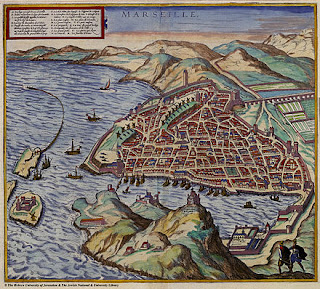A gold coin of King Guntram
Let's start by looking at the incident from the year 588 that I came across. It concerns King Guntram, who ruled the Kingdom of Orléans, a part of the Frankish realm, from AD 561 to AD 592. Due to the murderous family feuding of the Merovingian Dynasty, Guntram was ruling Marseilles by 588. The city and port was enormously important at the time, mainly because customs and tariffs were a major source of royal income. Whoever ruled a major port would automatically be a very wealthy ruler indeed.
A view of medieval Marseilles
In the year 588 a terrible disease broke out in Marseilles, killing thousands, halting trade and disrupting the smooth flow of taxes to King Guntram. From the symptoms of the disease as described by a near contemporary chronicler, Bishop Gregory of Tours, the disease was almost certainly bubonic plague. This disease - known to historians as the Plague of Justinian - hit the great city of Constantinople in the year 541, having apparently arrived from Egypt. Within a few years the plague had spread first around the Mediterranean and then across Europe. The death toll in most areas is unknown, but in Constantinople was around 40% of the population. The plague came back every few years for several generations - the outbreak in Marseilles in 588 being one such revisitation.
The painful swellings typical of bubonic plague
The Plague of Justinian hits Constantinople, from a later image
"King Guntram was well known for his charity, and much given to vigils and fasting. Like some good bishop providing remedies by which the wounds of a common sinner might be healed, King Guntram ordered the entire people to assemble in church and to celebrate the service of Rogations with great devotion. He then commanded that everyone should eat and drink nothing but barley bread and pure water, and that all should be regular in keeping the religious vigils. His orders were obeyed, and he seemed so anxious about all his people that he might well have been taken for one of Our Lord's Bishops, rather than for a king."
What struck me about this episode were the parallels with the corona virus today. A disease has struck the UK. Thankfully the death rate - something under 1% is nothing like as terrible as the 40% that bubonic plague could manage, but is nonetheless shocking to a modern society unaccustomed to fatal epidemics. The people turn to the government. The government in turn takes the best advice that it can find, and imposes on the people measures that it believes will bring relief from the disease.
In the case of King Guntram in 588, this took the form of frequent attendance at church services, plus a strict dietry regime of barley bread and water. For the UK government in 2020 it takes the form of social isolation and effective house arrest. Neither method actually cures the disease, nor lessens its effects on those that catch it. Guntram hoped that by displaying holiness and doing penance, the people would persuade God to remove the plague. The modern plan is to "flatten the curve" so that at no point is the NHS overwhelmed. But unless a cure or vaccine is found, coronavirus will infect something approaching 80% of the population before herd immunity is achieved. All the social isolation is doing is delaying the spread of the disease so that fewer people have it at any one time.
The second thing that struck me was that both "solutions" to an incurable epidemic disease involved a fair degree of hardship for the hapless popultion. The good folk of Marseilles had to spend long hours in churches taking part in rituals. The good people of the UK have to spend pretty much all their time cooped up indoors, emerging on to their doorsteps on Thursday evenings to clap the NHS. Admittedly the UK government in 2020 has not yet gone so far as to impose a bread and water diet on their population - though the European Union has decreed [with no evidence at all] that drinking alcohol when suffering from coronavirus is very dangerous. The default instinct of those in authority, it seems, is to respond by imposing even more misery on those already suffering.
When, I wonder, will governments and doctors decree that the best course of action when tackling a disease is to go down the pub with your mates, or tuck into a massive helping of steak and chips?
You can find out more about King Guntram HERE
You can find out more about the Plague of Justinian HERE
You can find out more about Marseilles HERE
You can find out more about bubonic plague HERE
You can find out more about Gregory of Tours HERE









No comments:
Post a Comment